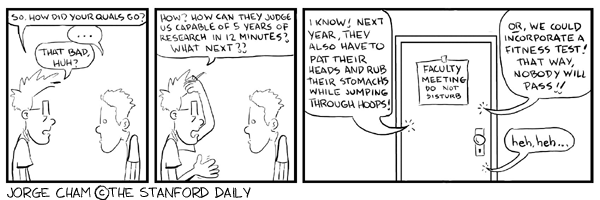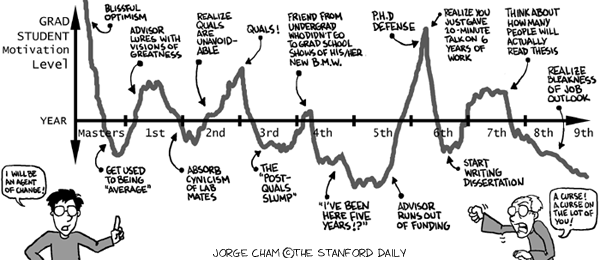Reflections on the Qualifying/Comprehensive Exams
The first half of this year was a pretty tough time for me. I was preparing to take my qualifying/comprehensive exams, also known as 'Quals'. For the FIU PhD student, these are the exams you must pass in order to become a PhD candidate, which is the point you prove your worthiness/ability to finish and get the okay to continue with your graduate program. At FIU's Biology department, the exams usually consist of 1 day of written responses to questions from each of your committee members (that means 5 straight days of writing) and, about 2 weeks later, a 2-3 hour oral exam with your whole committee. The format can vary based on committee members' preferences or department rules. You receive the official title of PhD candidate once you defend your dissertation proposal, after the exams are over.
Several months before the exams, I met with each of my committee members to discuss the topics their questions will focus on, and what materials I should study. Soon enough, I had a mountain of papers and a whole textbook to read. It's important during this time to make sure each committee member knows and remembers the specific topics they agreed to test you on. My committee was pretty good about sticking to their questions, but I've heard stories of other professors who were not so nice.
My experience preparing for the exams seemed really like an internal battle. It was a battle with myself to stay motivated, focused, and able to retain all the information I was learning. It was really intimidating to know I was going to be tested by experts on the Everglades, diatoms, and community and ecosystem ecology. There were times when I felt like these exams were basically an intellectual hazing by the professors - they had to go through them so their students have to do it too!
There were many times I felt quite overwhelmed with the reading I had to do, especially because with each paper I read, I needed to find and read several papers associated with that one. I felt a lot of pressure and stress. I felt like I wasn't making as much progress as I should be. That struggle with myself took a toll on me - I lost over 8 lbs and at one point I actually went below 100 lbs (I'm 5'4'' and my normal weight is around 110). People deal with stress in different ways, which can mean both losing or gaining weight.
On a more positive note, preparing for these exams is supposed to be the time when you have the most knowledge. It is a great push to learn as much as possible in your field and to have these ideas fresh in your head. It is a period when you can spend the time and energy to put concepts together and just to think about these ideas. It gives you a great background to build or improve your research proposal.
The build up to the exams was the worst part - especially the feeling of not knowing exactly what I was going to be asked, which made me feel like I had to cram everything possible into my head. The actual exams themselves were not terrible. It felt great to put everything I had learned down on paper or to speak about them. The exams are supposed to make you think about things that don't have clear answers. And it is important to realize it is okay to say 'I don't know.' My committee members were very encouraging, even when I didn't have the exact answer they were looking for.
Once the exams were over and my proposal was defended, I felt a huge weight come off my shoulders. But I still didn't feel like myself yet. In June, I went to Iowa to develop and teach a diatom camp for high school students. That wasn't very relaxing but it felt great to focus on something else and to regain my enthusiasm for a topic I really enjoy. After that, I went home to my parents and was fed delicious home-cooked Korean meals. Then, I took a really relaxing weekend vacation in the Naples, FL area. I finally felt like I was back to normal again and had new vigor for my research!
What I felt was really helpful was getting advice or just talking about the exams with students who have already been through them. Looking back, I would do a couple things differently. I wouldn't force myself to sit for hours in one place and read as much as possible. It is so important to give your body and brain a break! I definitely feel like I am more efficient when I put time aside everyday to go to the gym (even just 30min or an hour a day) and to go outside in the warm Florida sun to recharge my vitamin D once in a while. I would also remember that while these exams are an important milestone, it's not such a huge deal in the grand scheme of things. I would try to remember there are other important things in life (especially family and friends) and not let these exams take over my life so much.
Everyone has a different experience with these exams - if you have a story or advice to share, or a question about the exams, please comment!
Several months before the exams, I met with each of my committee members to discuss the topics their questions will focus on, and what materials I should study. Soon enough, I had a mountain of papers and a whole textbook to read. It's important during this time to make sure each committee member knows and remembers the specific topics they agreed to test you on. My committee was pretty good about sticking to their questions, but I've heard stories of other professors who were not so nice.
My experience preparing for the exams seemed really like an internal battle. It was a battle with myself to stay motivated, focused, and able to retain all the information I was learning. It was really intimidating to know I was going to be tested by experts on the Everglades, diatoms, and community and ecosystem ecology. There were times when I felt like these exams were basically an intellectual hazing by the professors - they had to go through them so their students have to do it too!
 |
| Some schools or programs have a different meaning for 'quals.' They're more like qualification to begin your degree program, rather than advancement to candidacy. |
There were many times I felt quite overwhelmed with the reading I had to do, especially because with each paper I read, I needed to find and read several papers associated with that one. I felt a lot of pressure and stress. I felt like I wasn't making as much progress as I should be. That struggle with myself took a toll on me - I lost over 8 lbs and at one point I actually went below 100 lbs (I'm 5'4'' and my normal weight is around 110). People deal with stress in different ways, which can mean both losing or gaining weight.
On a more positive note, preparing for these exams is supposed to be the time when you have the most knowledge. It is a great push to learn as much as possible in your field and to have these ideas fresh in your head. It is a period when you can spend the time and energy to put concepts together and just to think about these ideas. It gives you a great background to build or improve your research proposal.
The build up to the exams was the worst part - especially the feeling of not knowing exactly what I was going to be asked, which made me feel like I had to cram everything possible into my head. The actual exams themselves were not terrible. It felt great to put everything I had learned down on paper or to speak about them. The exams are supposed to make you think about things that don't have clear answers. And it is important to realize it is okay to say 'I don't know.' My committee members were very encouraging, even when I didn't have the exact answer they were looking for.
Once the exams were over and my proposal was defended, I felt a huge weight come off my shoulders. But I still didn't feel like myself yet. In June, I went to Iowa to develop and teach a diatom camp for high school students. That wasn't very relaxing but it felt great to focus on something else and to regain my enthusiasm for a topic I really enjoy. After that, I went home to my parents and was fed delicious home-cooked Korean meals. Then, I took a really relaxing weekend vacation in the Naples, FL area. I finally felt like I was back to normal again and had new vigor for my research!
What I felt was really helpful was getting advice or just talking about the exams with students who have already been through them. Looking back, I would do a couple things differently. I wouldn't force myself to sit for hours in one place and read as much as possible. It is so important to give your body and brain a break! I definitely feel like I am more efficient when I put time aside everyday to go to the gym (even just 30min or an hour a day) and to go outside in the warm Florida sun to recharge my vitamin D once in a while. I would also remember that while these exams are an important milestone, it's not such a huge deal in the grand scheme of things. I would try to remember there are other important things in life (especially family and friends) and not let these exams take over my life so much.
 |
Everyone has a different experience with these exams - if you have a story or advice to share, or a question about the exams, please comment!


Comments
Post a Comment